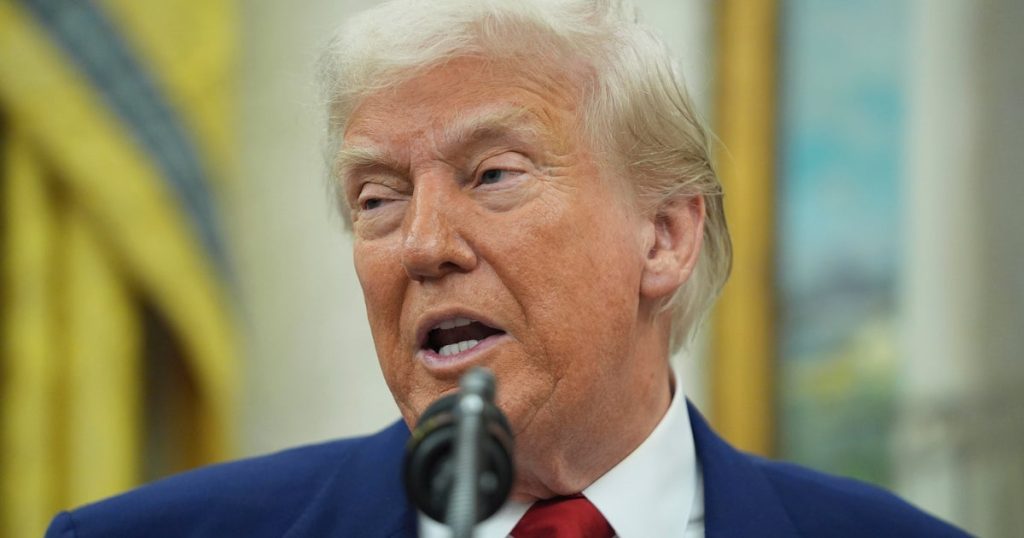In a surprising turn of events, former President Donald Trump has publicly severed ties with prominent conservative legal figure Leonard Leo, a former leader of the Federalist Society. This unexpected critique arose after a judicial panel indicated that many of Trump’s tariffs may be illegal, highlighting a rift between Trump and some factions of the conservative legal community. The fallout comes amidst ongoing tensions as Trump grapples with various judicial rulings that contradict his administration’s policies.
| Article Subheadings |
|---|
| 1) Trump’s Accusations Against Leo |
| 2) Legal Implications of Recent Rulings |
| 3) Leo’s Response to Trump’s Critiques |
| 4) Historical Context of Trump and Leo’s Relationship |
| 5) The Broader Impact on the Conservative Movement |
Trump’s Accusations Against Leo
In a recent post on social media, Donald Trump declared Leonard Leo a “bad person” who “probably hates America.” This rebuke was issued following a judicial panel’s ruling that deemed a major portion of Trump’s tariffs illegal. The ruling’s origins saw judges—two of whom were appointed by Trump, including a key benefactor within the conservative legal landscape. In his post, Trump labeled the judges’ decision a “horrible, Country threatening decision,” insinuating that the judges’ disdain for him influenced the verdict. Shifted focus towards Leo and the Federalist Society suggests a deeper frustration, given their past collaboration which facilitated Trump’s appointment of numerous federal judges.
Legal Implications of Recent Rulings
The judicial ruling regarding the legality of Trump’s tariffs has sent shockwaves through his administration, given its implications for his economic policies. Two of the judges who ruled against the tariffs were appointed by Republican officials, lending further credibility to the ruling among conservative legal scholars. The decisions highlight potential legal contradictions within Trump’s proposals, particularly concerning the interpretation of the nondelegation doctrine and the major questions doctrine. These legal frameworks question the breadth of executive authority when it comes to imposing sweeping tariffs, echoing sentiments voiced by various constitutional scholars.
Leo’s Response to Trump’s Critiques
In the wake of Trump’s criticism, Leo offered a measured response, expressing gratitude for Trump’s efforts to reshape the federal judiciary. Leo stated, “I’m very grateful for President Trump transforming the Federal Courts, and it was a privilege being involved… The Federal Judiciary is better than it’s ever been in modern history.” His response indicates a level of distance from Trump’s personal remarks, suggesting that his contributions to the judiciary remain valued, regardless of Trump’s recent tirade.
Historical Context of Trump and Leo’s Relationship
The relationship between Trump and Leo dates back to the 2016 election when Trump first pledged to consult the Federalist Society for his judicial appointments. Leo’s input was particularly influential during crucial decisions, including the nomination of Justices Brett Kavanaugh and Neil Gorsuch. However, recent tensions signify a turning point, as Trump openly questioned Leo’s advice, indicating that he might have misled Trump on several judicial nominations. This breach reveals an evolving dynamic, pushing Leo away from the stronghold he once had within Trump’s circle.
The Broader Impact on the Conservative Movement
This fractious relationship poses questions concerning the future of the conservative judicial movement, especially as Trump continues to grapple with judicial challenges that impede his agenda. The fallout with Leo could result in shifts within conservative legal circles, potentially complicating future strategies regarding judicial nominations and policy implementation. Additionally, Trump’s ongoing conflicts with the judiciary could galvanize or fracturize support from conservative factions, laying bare divisions that might influence upcoming electoral proceedings.
| No. | Key Points |
|---|---|
| 1 | Trump has publicly criticized Leonard Leo, calling him a “bad person.” |
| 2 | A recent judicial ruling has deemed many of Trump’s tariffs illegal. |
| 3 | Leo expressed gratitude for Trump’s transformation of the federal judiciary. |
| 4 | This criticism highlights a significant rift in Trump and Leo’s long-standing relationship. |
| 5 | The ongoing conflict may impact the strategies of the conservative legal movement. |
Summary
The recent clash between Donald Trump and Leonard Leo delineates a broader narrative of tension within the conservative legal community. Trump’s dramatic denouncement of Leo, alongside the judiciary’s ruling against his tariffs, suggests a potential unraveling of alliances that have defined his judicial appointments. As both sides navigate these contentious waters, the future of conservative legal strategies and the integrity of Trump’s legacy remain at stake.
Frequently Asked Questions
Question: What is the Federalist Society?
The Federalist Society is a conservative legal organization that aims to influence the legal community and judicial appointments, advocating for a textualist and originalist interpretation of the Constitution.
Question: Why did Trump criticize Leo?
Trump criticized Leo following a judicial ruling that struck down many of his tariffs as illegal, reflecting a growing frustration with Leo’s influence over his judicial appointments.
Question: How might this conflict affect the conservative movement?
The conflict could create significant divisions among conservatives, impacting future judicial nominations and strategies aimed at advancing conservative policies.
